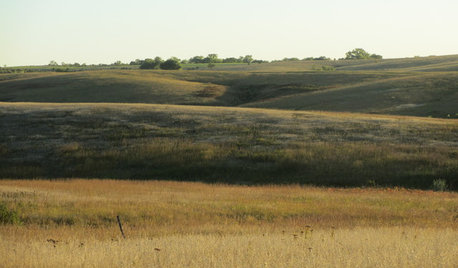Would you get either 1 cow or goats?
mersiepoo
16 years ago
Related Stories

FUN HOUZZThe Cutest Darn Animals on Houzz
You might end up admiring these horses, goats, llamas and more until the cows come home
Full Story
GARDENING GUIDESHow to Get Your Prairie On
Have a field day with your landscape, even if you've got just a few modern containers on a paved path
Full Story
HOUZZ TOURSMy Houzz: An Orange County Ranch Gets Into the Swing of Things
Golf course views and a mild climate feature in this 1960s ranch remodeled in midcentury modern style
Full Story
HOUZZ TOURSHouzz Tour: A Family Home Grows and Gets a New Face
An addition and an architectural renovation lead to an elegant yet comfy Craftsman for a California family of 6
Full Story
REMODELING GUIDESGet What You Need From the House You Have
6 ways to rethink your house and get that extra living space you need now
Full Story
LIFEHow to Get Along With the Neighbors — and Live Happier at Home
Everyone wins when neighbors treat one another with kindness, consideration and respect
Full Story
GARDENING GUIDESGet on a Composting Kick (Hello, Free Fertilizer!)
Quit shelling out for pricey substitutes that aren’t even as good. Here’s how to give your soil the best while lightening your trash load
Full Story
EDIBLE GARDENSNatural Ways to Get Rid of Weeds in Your Garden
Use these techniques to help prevent the spread of weeds and to learn about your soil
Full Story
ORGANIZINGGet Organized: Are You a Piler or a Filer?
Tote out the bins and baskets and learn how to be an organized piler if file cabinets leave you cringing
Full Story
LIFEGet the Family to Pitch In: A Mom’s Advice on Chores
Foster teamwork and a sense of ownership about housekeeping to lighten your load and even boost togetherness
Full Story





Happy2BeeME
hotzcatz
Related Professionals
Surprise Landscape Contractors · Bowie Landscape Contractors · Burlington Landscape Contractors · Fort Myers Landscape Contractors · Louisville Landscape Contractors · Monterey Landscape Contractors · Pikesville Landscape Contractors · Pine Hills Landscape Contractors · Shaker Heights Landscape Contractors · League City Fence Contractors · Silver Spring Fence Contractors · Aventura Decks, Patios & Outdoor Enclosures · Norman Decks, Patios & Outdoor Enclosures · Waukesha Decks, Patios & Outdoor Enclosures · Woodstock Decks, Patios & Outdoor Enclosuresbuckeye_brian
backlanelady
billie_ladybug
mersiepooOriginal Author
lesli8
cpp6318
lesli8
roostersgirl
HerringboneD28
cpp6318
lesli8
lesli8
highplainswoman
brendan_of_bonsai
lucky_p
highplainswoman
lucky_p
highplainswoman
cpp6318
brendan_of_bonsai
lucky_p